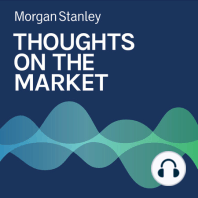3 min listen

Vishy Tirupattur: Can Corporate Credit Provide Shelter?
Vishy Tirupattur: Can Corporate Credit Provide Shelter?
ratings:
Length:
4 minutes
Released:
Oct 4, 2022
Format:
Podcast episode
Description
With investors becoming pervasively bearish on stocks and bonds in the face of a worsening growth outlook, can the U.S. investment grade credit market provide shelter from the storm?----- Transcript -----Welcome to Thoughts on the Market. I am Vishy Tirupattur, Morgan Stanley's Global Director of Fixed Income Research. Along with my colleagues, bringing you a variety of perspectives, today I'll share why corporate credit markets may be a sheltering opportunity amid current turbulence. It's Tuesday, October 4th, at 11 a.m. in New York. At a September meeting, the Federal Open Market Committee delivered a third consecutive 75 basis point rate hike, just as consensus had expected. The markets took this to mean a higher peak and a longer hiking cycle, resulting in sharp spikes in bond yields and a sell off in equities. At the moment, both 2 and 10 year Treasury yields stand at decade highs, thanks to pervasively bearish sentiment among investors across both stocks and bonds. As regular listeners may have heard on this podcast, Morgan Stanley's Chief Global Economist, Seth Carpenter, has said that the worst of the global slowdown is still likely ahead. And our Chief U.S. Equity Strategist, Mike Wilson, recently revised down his earnings expectations for U.S. equities. Navigating this choppy waters is a challenge in both risk free and risky assets due to duration risk in the former, and growth or earnings risks in the latter. Against this backdrop, we think the U.S. investment grade corporate bonds, IG, particularly at the front end of the curve, which is to say 1 to 5 year segment, could provide a safer alternative with lower downside for investors looking for income, especially on the back of much higher yields. But investors may wonder, wont credit fundamentals deteriorate if economy slows, or worse, enters the recession and company earnings decline. Here is where the starting point matters. After inching higher in Q1, median investment grade leverage improved modestly in the second quarter and is well below its post-COVID peak in the second quarter of 2020. Gross leverage is roughly in line with pre-COVID levels. Notably, while median leverage is back to pre-COVID levels, the percentage of debt in the leverage tail has declined meaningfully. But if earnings were to decline, as our equity strategists expect, leverage ratios may pick back up. That said, interest coverage is the offsetting consideration. Given the amount of debt that investment grade companies have raised at very low coupons over the years, their ability to cover interest has been a bright spot for some time. Despite sharply higher rates, median interest coverage improved in the second quarter and is around the highest levels since early 1990. This modest improvement in interest coverage comes down to the fact that even though yields on new debt are higher than the average of all outstanding debt, the bonds that are maturing have relatively high coupons. Therefore, most companies have not had to refinance at substantially higher funding levels. In fact, absolute dollar level of interest expense paid out by IG companies actually declined in the quarter and is now well below the peaks of 2021. With limited near-term financing needs, higher rates are unlikely to dent these very healthy interest coverage ratios. The combination of strong in-place investment grade fundamentals, relatively low duration for the 1 to 5 year segment and yields at decade highs, suggests that this part of the credit market offers a relatively safe haven to weather the storms that are coming for the markets. History provides some validation as well. Looking back to the stagflationary periods of 1970s and 80's, while we saw multiple decisions and volatility in equity markets, IG credit was relatively stable with very modest defaults. And while history doesn't repeat, it does sometimes rhyme, so we look to the relative safety of IG credit once again in the current environment. Thanks for listeni
Released:
Oct 4, 2022
Format:
Podcast episode
Titles in the series (100)
Mike Wilson: Are U.S. Economic Indicators Flashing Yellow? by Thoughts on the Market